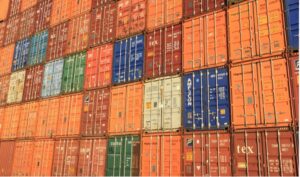The trade corridor between China and Nigeria is a bustling artery of global commerce. Businesses in Nigeria leverage China’s manufacturing prowess to source a vast array of goods, from electronics and garments to machinery and building materials. However, navigating the intricacies of international freight forwarding can be daunting for those unfamiliar with the process. This comprehensive guide explores the crucial role of freight forwarders in facilitating seamless imports from China to Nigeria, empowering you to make informed decisions and optimize your supply chain.
Understanding the Role of Freight Forwarders in China-Nigeria Trade

Freight forwarders act as your trusted intermediary, handling the complexities of international shipping from origin (China) to destination (Nigeria). Their expertise encompasses a vast array of tasks, including:
- Customs Clearance: Freight forwarders navigate the often-complex customs regulations of both China and Nigeria, ensuring your cargo complies with all import/export requirements.
- Documentation Management: They meticulously prepare and manage essential shipping documents, such as commercial invoices, bills of lading, and packing lists.
- Route Selection and Booking: They assess your specific needs (urgency, cost, cargo type) and recommend the most suitable shipping route (air or sea) and secure bookings with reliable carriers.
- Consolidation and Warehousing: Freight forwarders can consolidate smaller shipments from multiple suppliers into a single container, reducing overall costs. They may also offer warehousing services in China if needed.
- Cargo Insurance: They can help you acquire cargo insurance to protect your shipment against potential damage, loss, or theft during transit.
- Logistics Management: They oversee the entire logistical flow, from pick-up at the supplier’s warehouse in China to final delivery at your designated location in Nigeria.
Unleashing the Benefits of a Freight Forwarder for Your Nigerian Business

Partnering with a reputable freight forwarder for your China-Nigeria imports unlocks a multitude of advantages:
- Streamlined Operations: By delegating the intricacies of international shipping to a professional, you free up valuable time and resources to focus on core business activities.
- Reduced Costs: Freight forwarders leverage their extensive network of carriers and negotiate competitive rates, potentially saving you money on transportation costs.
- Enhanced Efficiency: Their expertise in customs clearance and documentation ensures a smoother and faster import process, minimizing delays and potential disruptions.
- Risk Mitigation: Freight forwarders possess the knowledge and experience to navigate potential risks associated with international shipping, such as customs complications or unforeseen delays.
- Improved Visibility: They offer real-time shipment tracking, allowing you to monitor your cargo’s progress throughout its journey from China to Nigeria.
Choosing the Right Freight Forwarder: Key Considerations

Selecting the ideal freight forwarder requires careful consideration of several factors:
- Experience: Opt for a freight forwarder with a proven track record of handling China-Nigeria trade lanes. They should possess thorough knowledge of import/export regulations specific to both countries.
- Service Offerings: Ensure the freight forwarder caters to your specific needs. Do they offer air and sea freight options? Do they provide value-added services like cargo insurance or warehousing?
- Pricing and Transparency: Compare quotes from several freight forwarders to ensure you receive competitive rates. Seek a transparent pricing structure with no hidden fees.
- Communication and Customer Service: Choose a freight forwarder with a strong focus on clear communication and responsive customer service, keeping you informed throughout the shipping process.
- Financial Stability: Partner with a financially stable freight forwarder with a reputation for reliability and timely delivery.
Demystifying the China-Nigeria Shipping Process
Understanding the typical stages involved in shipping goods from China to Nigeria empowers you to better manage your expectations and anticipate potential delays. Here’s a simplified breakdown of the process:
- Quotation and Booking: Once you finalize your purchase order with your Chinese supplier, contact your chosen freight forwarder to obtain a shipping quote and book your shipment.
- Cargo Preparation and Collection: Your supplier prepares your goods for shipment according to export regulations. The freight forwarder arranges pick-up from the supplier’s warehouse.
- Customs Clearance (China): The freight forwarder ensures all necessary export documentation is complete and liaises with Chinese customs for clearance.
- Transportation (Air or Sea): Depending on your chosen mode of transport (air or sea), your cargo is loaded onto the designated carrier.
- Customs Clearance (Nigeria): The freight forwarder manages the import clearance process with Nigerian customs, ensuring all documentation is accurate and duties are paid.
- Delivery: Once cleared by customs, your cargo is delivered to your designated location in Nigeria.
Essential Documentation and Customs Clearance Requirements

Navigating customs regulations can be a complex task. Here are some key documents typically required for importing goods from China to Nigeria:
Commercial Invoice: This document details the transaction between you and your Chinese supplier, including product descriptions, quantities, unit prices, and total value. Bill of Lading (Sea Freight) or Air Waybill (Air Freight): These documents serve as contracts of carriage, outlining the terms and conditions of transportation between the shipper (you) and the carrier (shipping line or airline). Packing List: This document provides a detailed breakdown of your shipment’s contents, including item descriptions, quantities, and packaging information. Certificate of Origin: This document certifies the country where your goods were manufactured. It may be required by Nigerian customs depending on the type of product you are importing. Import Duty Payment Receipt: Proof of payment for any applicable import duties and taxes levied by Nigerian customs.
Pro Tip: Partnering with a knowledgeable freight forwarder streamlines the customs clearance process. They can guide you through the specific documentation requirements for your goods and ensure all paperwork is accurate and complete, minimizing delays at the port.
Mastering the Logistics and Transportation Landscape
The choice between air and sea freight for your China-Nigeria shipment hinges on your budget and urgency considerations:
- Air Freight: Ideal for time-sensitive cargo or perishables. Offers faster transit times (typically 3-7 days) but comes at a higher cost per kilogram compared to sea freight.
- Sea Freight: The most cost-effective option for large shipments or non-perishable goods. Transit times can range from 30 to 45 days depending on the origin and destination ports.
Additional Services: Many freight forwarders offer value-added services to enhance your shipping experience. These may include:
- Cargo Consolidation: Combining smaller shipments from multiple suppliers into a single container, reducing overall transportation costs.
- Warehousing: Providing temporary storage solutions in China if you require them before shipment.
- Cargo Insurance: Securing insurance to protect your goods against potential damage, loss, or theft during transit.
Navigating Potential Challenges and Risks
While China-Nigeria trade offers immense potential, there are inherent risks to consider:
- Customs Delays: Complexities in customs clearance can lead to unexpected delays. Partnering with a reputable freight forwarder experienced in handling Nigeria-bound shipments can significantly mitigate this risk.
- Currency Fluctuations: Fluctuations in exchange rates can impact your landed costs. Consider strategies like forward contracts to manage currency risks.
- Cargo Damage: Accidents can happen during transportation. Cargo insurance is crucial to protect your investment in case of unforeseen damage or loss.
- Political or Economic Instability: Unforeseen political or economic disruptions in either China or Nigeria can impact shipping schedules. Staying informed about current events can help you plan accordingly.
Pro Tip: Effective communication with your freight forwarder is key to navigating potential challenges. They can provide real-time updates on your shipment’s progress and proactively address any unforeseen issues that may arise.
freight forwarder from China to Nigeria
Cost Considerations and Budgeting for Freight Forwarding Services

The overall cost of freight forwarding services depends on several factors:
- Mode of Transport (Air or Sea): Air freight is typically more expensive than sea freight.
- Shipment Weight and Volume: Larger and heavier shipments generally incur higher transportation costs.
- Origin and Destination Ports: The distance between the origin and destination ports impacts transportation costs.
- Value-Added Services: Additional services like cargo insurance or warehousing will add to the overall cost.
Obtaining Quotes: Reputable freight forwarders will provide comprehensive quotes outlining all associated costs, including transportation fees, customs clearance charges, and any applicable value-added services.
Budgeting Tips:
- Plan in Advance: Securing quotes early in the sourcing process allows you to factor in freight forwarding costs when calculating your landed cost per unit.
- Consolidate Shipments: If possible, consolidate smaller shipments from multiple suppliers to reduce overall transportation costs.
- Negotiate Rates: Don’t be afraid to negotiate competitive rates with different freight forwarders.
By understanding the role of freight forwarders, their service offerings, and the intricacies of the China-Nigeria shipping process, you can make informed decisions and navigate the trade route with confidence. Partnering with a reputable freight forwarder simplifies logistics, streamlines customs clearance, and mitigates potential risks, allowing you to focus on growing your Nigerian business and building a successful import operation.
freight forwarder from China to Nigeria





